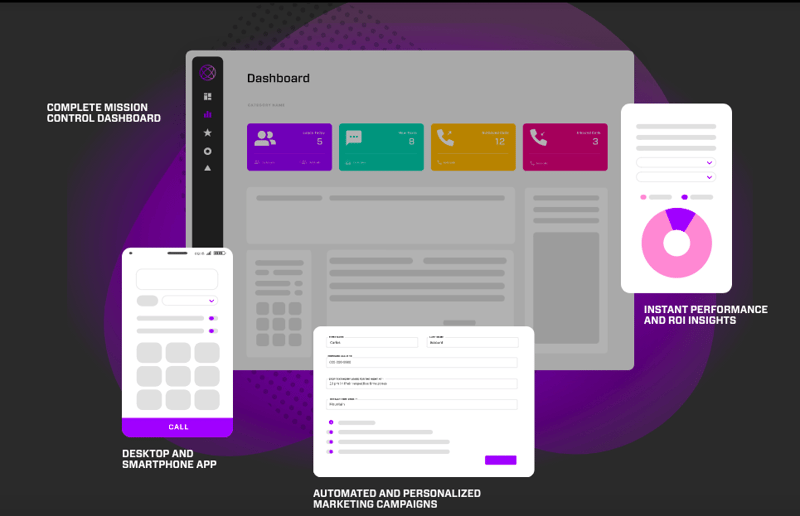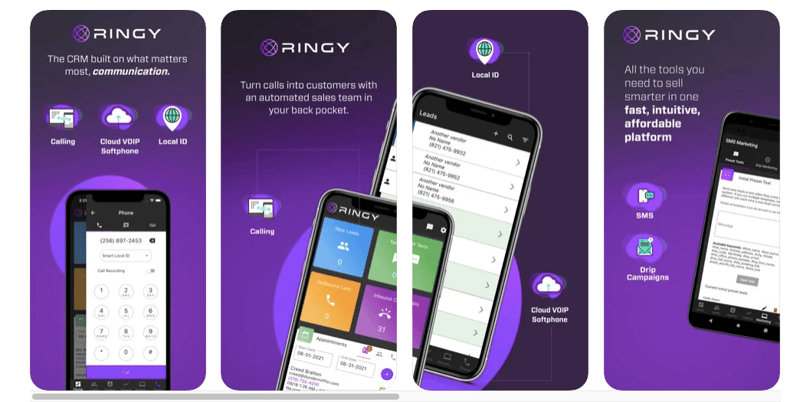
12 Tips to Maximize Your Sales Efforts With Text Marketing
 Updated on
Updated on
By Ringy
Table of Contents
Table of Contents
SMS has been around for a wee while now.
I mean, it's been a thing since before phones got smart.
Why then, are a massive 61% of marketers not using text marketing?
This, in the face of the fact that ¾ of consumers would like to see more SMS action from the companies they buy from, seems more than a little absurd.
Is there something going on that makes text messaging software a poor fit for businesses? Is SMS business marketing not a viable avenue for growth-focused companies? Are you wasting your time even thinking about it?
As it turns out, the answer to all of these questions is a big old NO.
The problem, then?
Most marketers and salespeople simply don't know where to start.
Not you though, you know exactly where to start (hint: it's here.)
So let's start then!
What is Text Marketing?
Since we're only just getting to know each other, let's take things slowly, and start with a simple definition of text marketing to get us all on the same page.
Text marketing is, well, conducting marketing activities via SMS text messaging.
It doesn't get all too much more complicated than that, at least conceptually.
In action, text marketing can be used to notify shoppers of new promotions, keep in touch with prospects via drip campaign, or inform regular clients of date and location changes (such as in events management).
More often than not (since 85% of us have smartphones), SMS marketing includes linking out to a website or landing page.
Okay, so we've got a good grasp on what SMS text messaging for business is all about.
But seeing as the majority of marketers aren't using it, who the heck is?
Who Uses SMS Text Marketing?
Any company that has customers to talk to can implement a text system for business, but they tend to be more commonly used among the following industries:
|
Industry |
SMS used for |
|
Retail |
Inform customers of sales events, changes to health and safety policies, and update customers when orders have arrived. |
|
B2B sales |
Communicate with prospects regarding potential sales, account overages, and remind them of upcoming meetings. |
|
Restaurants |
Let customers know when their table is ready. |
|
Ecommerce |
Promote new online sales, keep customers up to date regarding the status of their online orders. |
|
Schools |
Update parents on school events, health and safety requirements, and outstanding bills. |
|
Real estate agencies |
Speak directly with home buyers and sellers, and let them know when a new property has hit the market. |
|
Events |
Reminders, updates, and changes regarding scheduled events. |
|
Gyms |
Communicate with gym members regarding promotions, events, and health and safety protocols. |
Types of SMS Marketing Services
SMS marketing services are designed to help businesses reach their customers quickly and efficiently through text messaging. They typically fall into three main categories: Promotional Messages, Transactional Messages, and Customer Engagement Messages.
Let's break them down:
|
Type |
Purpose |
Examples |
|
Promotional Messages |
Used to announce sales, special offers, or discounts. |
"Get 20% off your next purchase with code SUMMERFUN." |
|
Transactional Messages |
Sent to confirm orders, provide shipping updates, or remind customers of appointments. |
"Your order has been shipped. Tracking number: 123456" |
|
Customer Engagement Messages |
Used to gather feedback, improve customer satisfaction, or promote loyalty programs. |
"Take our survey and win a $50 gift card!" |
1. Promotional Messages
Promotional messages are designed to generate sales and excitement around your brand. Businesses use text marketing platforms to announce flash sales, new product launches, special discounts, and more.
Because SMS open rates are as high as 98%, it's an extremely effective method for delivering time-sensitive promotions. For example, sending a last-minute "50% off for 24 hours" text can drive significant traffic and conversions.
2. Transactional Messages
Transactional SMS marketing is essential for providing customers with important information about their orders, shipping, or appointments. By sending timely and relevant messages, you can improve the customer experience and build trust.
For instance, you could send a confirmation message when a customer places an order, a shipping update when the order is on its way, or a reminder message before an appointment.
3. Customer Engagement Messages
Customer engagement messages aim to create deeper relationships with your audience through surveys, feedback requests, and loyalty program updates. Businesses can use text message marketing for small businesses to ask customers about their experience or offer rewards.
For example, a text saying, "We'd love your feedback! How was your recent experience with us? Click here to rate us," not only encourages interaction but also provides valuable insights into your service.
Similarly, loyalty programs can benefit from sms text marketing, with texts like, "You've earned 50 points! Redeem now and enjoy exclusive rewards."
Using text messaging software, businesses can segment their audience and personalize these messages, ensuring that customers feel valued and engaged.

Take your sales to new heights with Ringy.
Sales in a slump? Ringy gives you the tools and flexibility you need to capture leads, engage with them, and turn them into customers.
8 Benefits of Using Text Marketing Platforms
1. Improved Customer Service
Bringing on board a text service for business gives you the opportunity to provide updates and customer support via a platform that your customers are already familiar with, removing friction and improving their experience.
2. A Less Invasive Experience

This benefit is enabled by the fact that your SMS receivers have all opted into your communications (it's part of your legal requirements when engaging in text message programs.)
This means they are:
- Open to hearing from you
- Expecting to hear from you
- Glad to hear from you once they do
This has a flow-on effect for sales conversion, with the average SMS click-through rate hitting around 33%.
3. Cost-Effective Marketing
SMS marketing is incredibly cost-effective and has huge upside potential.
In fact, mobile SMS marketing is so effective that 73% of marketers believe it is the marketing channel with the highest return on investment.
Sounds like a win-win scenario, huh?
4. Health and Safety Benefits
Yes, we're all sick and tired of the dreaded C-word, we know.
But here's the thing:
SMS marketing makes it super easy to communicate with your customers during covid without having to meet them face to face, keeping health risks as low as possible.
5. Less Saturated Than Email
Everyone's doing email marketing these days.
But as we've already established, most are missing out on the SMS buzz.
This allows savvy marketers to cut through in an area where attention is at a maximum, and saturation is at a minimum.
6. Better Reach
These days, people always have their phones on them.
Heck, there's a good chance you're reading this while on you're phone!
And though many of us have our emails connected via an email app, some of us choose to shut this part of our lives away by turning notifications off, only checking emails when it suits them.
And guess what happens to your marketing emails then?
A text message campaign, on the other hand, lands every time. It extends your reach and resulting in a metric butt-tonne of SMS sales.
Seriously.
Of the 33% who click on your CTA, 47% will go through to make a purchase.
That means a little over 15% of your SMS receivers will go on to buy from you. Nice!
7. Efficient Marketing Campaigns
Text marketing is easy!
Once you've got your business texting software all set up, all you have to do is craft your message, add a CTA, select who you want to send it out to, and hit GO.
Then, you sit back and watch the sales pile in. Or do you?
8. Insightful Analytics

The last key benefit of SMS message marketing platforms being it provides marketers and sales reps with a tonne of data on how their campaigns are performing.
Well, the good ones do.
By leveraging reports and dashboards inside your text marketing software, you'll be able to track and analyze metrics such as:
- Click-through rates
- List growth rates
- Opt-out/unsubscribe rates
- Sales conversion rates
- Response rates
- Return on investment
12 Tips To Launch a Successful Text Campaign
All 8 of those benefits sounding pretty good?
Chomping at the bit to get started with bulk SMS marketing?
Before you jump straight in, take heed of these 12 top tips to text marketing triumph:
1. Get Permission
Before you even get started, there are a few rules surrounding text messaging for business that you need to know.
If you're planning on sending SMS messages in North America, familiarize yourself with these legislations:
One of the main takeaways from all three acts is that you need to obtain consent before texting customers.
So, you need to have a way to get customers to opt-in, which is generally done using a form on your website.
A means for doing this is typically provided by your texting marketing software.
2. Segment Your Audience

To start with, you might only have a few customers on your text marketing list.
However, as your customer base grows, so too will your SMS database.
Soon, you'll reach a point where a single message doesn't suit you all. This is where you need to start segmenting your audiences.
Segmentation means that you take your SMS database, and create separate lists based on specific criteria.
For example, let's say you're an insurance broker, and you have three products:
- Life insurance
- Health insurance
- Home insurance
You can then go into your insurance CRM, segment your customers based on the product they've purchased, and then use your text marketing app to craft and send customized messages that are relevant to each type of customer.
3. Keep It Short
Text messages aren't meant to be super long.
If you've got a big company update or important privacy notice changes to roll out, then you're better off sticking to email with that one.
Using SMS messaging for shorter communications, for example:

4. Focus On Quality Over Quantity
This one's actually two tips (aren't we kind?)
- Don't bombard your customers with SMS messages. You'll just tick them off, and they'll end up unsubscribing (this is the quantity part)
- Make sure you deliver a high degree of value each time you send an SMS (that's the quality component). This means each text message better have an actionable offer or some really crucial advice, otherwise, you're wasting your and your customers' time
5. Avoid Inappropriate Send Times
Don't be that company that texts their customers at 7 am in the morning.
We get it, you're trying to get them when they just woke up, and they're checking their phone anyway.
Cool, nice logic, but it's not typically all that welcome. At that time, most of us were barely caffeinated, and the little effort we are putting into our phones was generally just swiping away emails received overnight.
Don't let your message fall into the same basket.
As a general rule, don't send SMS messages before 8 am or after 7 pm.
6. Send SMS Messages At Irregular Times
While we're on the subject of SMS send times, try mixing up your scheduling.
Most marketers are inclined to schedule an SMS send on the hour, for example, at 6 pm.
Here's the thing:
Most marketers are doing that.
The result is that customers receive a bunch of text messages all the same time. Obviously, that has a negative impact on the effectiveness of your campaigns, but it also shatters the illusion of meaningful communication, at least to some degree, as savvy customers cotton on to the fact that you've actually scheduled a bulk SMS sending.
Try weird send times like:
- 11:12 am
- 2:49 pm
- 5:24 pm
7. Personalize Your Messages
A bit of context-awareness goes a long way in marketing.
So, consider the context of SMS messaging.
For the most part, it's friends, family members, colleagues, and lovers chatting casually. That is, it's intensely personalized.
If you come in all hot and heavy with the "Dear valued customer", you're going to stand out like a severed thumb.
Sure, there's more to personalization than just using their name in your messages, but it's a damn good start.
8. Track And Analyze Your Campaigns
Not all SMS messages are going to be winners.
In order to continue improving your effectiveness, you should be tracking and analyzing each of your SMS sends.
Look at things like click-through rates and reply rates (which means you should give them a way to actually reply to you!) to gauge how well things are going.
Consider splitting your audience and sending the same message to half via SMS, and half via email. Do this for a few different email types (company updates, sales promotions), and see if one platform is better than the other for specific kinds of messages.
9. Use A/B Testing

Speaking of tracking and analysis, SMS marketing is a great place to get your A/B test on!
Using A/B testing, you can pit two different messages against each other and see which performs better and in which context.
You can even get super-micro here, and simply A/B test different kinds of calls to action.
Speaking of...
10. Include Only One CTA
Don't bombard your audience with lists of stuff to do.
SMS messages tend to perform better with just a single call-to-action, as your customers have a clear path forward to their next step.
11. Give New Customers a Good Reason to Opt-in
A mistake too many marketers make is assuming that everyone will just magically want to sign up for their text updates.
They don't.
You have to give them a seriously good reason to. That is, you have to show them what's in it for them.
Exclusivity is a good motivator to leverage here.
For example, you can inspire new customers to opt-in for your SMS messaging by announcing that exclusive members-only promotional codes will be sent only by SMS.
Of course, you've got to follow through on this promise as well!
12. Avoid ‘Hip' Text Language
Guys, it's not 2003 anymore.
Kids aren't out there texting ‘C U L8R'. Nobody has a T9-equipped mobile anymore, we're all working on QWERTY keypads with predictive text.
Unless you want to come across like the not-so-cool mom, just spell out the damn words.
Integrating Text Marketing with Other Marketing Channels
SMS marketing doesn't have to be a standalone strategy. In fact, it can be even more effective when integrated with other marketing channels. Combining text messages with email, social media, and other digital marketing efforts can create a more comprehensive and personalized customer experience.
Omni-Channel Marketing Strategies
Benefits of integrating text marketing with email, social media, and other digital marketing efforts:
- Increased Reach: By using multiple channels, you can reach customers who may not be active on all platforms.
- Improved Engagement: Combining SMS with other channels can create a more consistent and engaging customer experience.
- Enhanced Personalization: You can tailor your messages to each customer's preferences and behavior.
- Higher Conversion Rates: By using a multi-channel approach, you can increase the likelihood of customers taking the desired action, such as making a purchase.
Examples of cross-channel campaigns that combine SMS with other channels for maximum impact:
- Welcome Series: Send a welcome email with a link to a personalized SMS opt-in form. Once the customer opts in, send a series of SMS messages with exclusive offers or tips.
- Abandoned Cart Reminders: When a customer adds a product to their cart but doesn't complete the purchase, send an email reminder with a link to the cart. Follow up with an SMS reminder if they haven't purchased within a certain timeframe.
- Post-purchase Follow-ups: After a customer makes a purchase, send a thank-you email with a link to a customer satisfaction survey. Follow up with an SMS message asking for feedback or offering a discount on their next purchase.
Automation and Workflows
Using marketing automation tools to trigger text messages based on customer behavior or lifecycle stages:
- Customer Segmentation: Create segments based on customer demographics, preferences, or behavior.
- Trigger-based Messaging: Set up rules to trigger SMS messages based on specific actions, such as making a purchase, opening an email, or visiting a website.
- Workflows: Create automated sequences of SMS messages to guide customers through the buying journey.
Workflow examples such as welcome series, abandoned cart reminders, and post-purchase follow-ups:
- Welcome Series: Trigger a series of SMS messages to new customers, providing them with valuable information, exclusive offers, and a personal touch.
- Abandoned Cart reminders: Automatically send SMS reminders to customers who leave items in their shopping carts, encouraging them to complete their purchase.
- Post-purchase Follow-ups: Send automated SMS messages to thank customers for their purchase, provide shipping updates, and offer additional products or services.
Challenges and Considerations in Text Marketing
While SMS marketing is a powerful tool, it's not without its challenges. To ensure successful campaigns, it's important to be aware of potential pitfalls and take steps to address them.
Overcoming Customer Fatigue
One of the biggest challenges in SMS marketing is customer fatigue. Sending too many messages can annoy customers and lead to unsubscribes. To avoid this, it's important to:
- Segment Your Audience: Send targeted messages to specific groups of customers based on their interests, demographics, or behavior.
- Keep Messages Relevant: Ensure that your messages are valuable and relevant to the recipient.
- Use a Conversational Tone: Write your messages in a natural, conversational style that engages customers.
- Provide an Opt-out Option: Make it easy for customers to unsubscribe from your messages.
Ensuring Message Deliverability
Message deliverability is another important factor to consider in SMS marketing. A number of factors can affect deliverability, including:
- Network Congestion: High network traffic can sometimes lead to delays or delivery failures.
- Incorrect Phone Numbers: Typos or outdated phone numbers can prevent messages from reaching their intended recipients.
- Blacklisting: If your SMS service provider is blacklisted by carriers, your messages may be blocked.
To improve deliverability, you should:
- Verify Phone Numbers: Use a phone number verification service to ensure that all numbers are accurate.
- Use a Reliable SMS Service Provider: Choose a provider with a good reputation and a high delivery rate.
- Monitor Delivery Rates: Keep track of your delivery rates and take steps to address any issues.
Privacy and Data Security Concerns
Privacy and data security are also important considerations in SMS marketing. Customers expect their personal information to be protected, and businesses have a responsibility to ensure that their data is handled securely. To protect customer data, you should:
- Obtain Explicit Consent: Get clear permission from customers before sending them SMS messages.
- Store Data Securely: Use encryption and other security measures to protect customer data.
- Be Transparent About Data Handling Practices: Clearly communicate your data handling policies to customers.
By addressing these challenges and considerations, you can create effective SMS marketing campaigns that reach your target audience and drive results.
Criteria to Consider When Choosing an SMS Marketing Software
Whether you're looking to invest in a text messaging service for a small business or a large enterprise, there are a few things you'll want to size up before you hand over that credit card.
Let's review the 6 most important factors to consider when choosing a text marketing software platform:
1. Ease of Use
This might seem like a no-brainer, but it's one that all too many of us fail to recognize the importance of:
How easy is the software to actually use?
Every provider tells you their platform is easy to use, and they probably believe it too, since they know it inside and out.
But we've all been in a situation where we've gone to jump into a new marketing campaign and realized that fancy tool we just bought was a whole lot more complex than we were expecting.
You'll want to choose an SMS messaging platform that has a modern interface that is easy to navigate and allows you to access your most commonly used functions within just a click or two.

It also helps if the service provider you're considering going with provides a thorough new-customer onboarding process, and/or has a bank of resources that show you how to use their platform.
2. Analytics
We spoke a little bit about analytics earlier and mentioned that you should be tracking things like click-through rates and CTA effectiveness.
Here's the thing:
Your insights are only as good as the analytics provided by the text marketing platform you're using.
Prioritize a platform that has a deep analytics suite, so that you can get right down to the details.
But, don't let that be at the expense of ease of use. You want to find a platform that allows you to dig down where needed, but also allows you to create a custom reporting dashboard, giving you access to all of your favorite reports in a single click.

3. Mobile App
Though you'll most likely be working within a desktop or web-based interface the majority of the time, you should seek to find a text marketing platform that allows you to make changes on the fly via a mobile app.

This way, if you get a Slack message from your marketing intern at 6 pm on a Tuesday to report an issue, you can easily jump into your app and remedy it before the send goes out.
4. Automation
Where would we be without automation?
Still doing way too much manual work, that's where.
A major feature that's well worth prioritizing when choosing a text marketing software provider is the ability to automate various parts of the process.
For example, if you want to send out a reminder text the day before a client meeting, you'll want to be able to automate that based on your calendar.
Or, say that you've created an entire SMS campaign, with 5 messages to be sent out of 5 weeks to convert a prospect into a paying customer.
Automation will allow you to add each new customer number to the pile, rather than having to manually send a message each week.
5. Safety And Security
Remember, you're dealing with your customers' private details here: their phone number.
When a customer opts in for SMS messages from your company, they are trusting that you'll keep their data safe and secure and that you aren't selling it off to another company (or putting it at risk of being stolen).
As such, part of your due diligence when choosing an SMS marketing service should be to investigate their data privacy and security policies.
6. CRM Integration
If you're looking seriously into text marketing, then it's pretty likely that you've got a decent database of users with which to communicate.
And, most likely, said data exists within your CRM.
Your CRM platform should be the hub of most sales and marketing activities, and if you're bringing on a third-party text marketing provider, you'll want to make sure it plays nicely with the systems you're already using.
This way, you can send SMS directly from the CRM, or at the very least pull data over from it.
Or, you know, you could simply opt for a platform that is both a CRM and a text marketing provider.
Oh hey, that's Ringy!
Your All in One CRM and Text Marketing Platform
Ready to get started sending automated SMS reminders and sales alerts to your customers?
It's pretty simple to set up if you've got the right text marketing platform by your side.
Just how simple?
Why not request a Ringy demo and find out!

Skyrocket your sales with the CRM that does it all.
Calling? Check. SMS? Check. Automation and AI? Check. Effortlessly keep in touch with your customers and boost your revenue without limits.

Take your sales to new heights with Ringy.
Sales in a slump? Ringy gives you the tools and flexibility you need to capture leads, engage with them, and turn them into customers.
Subscribe to Our Blog
Enter your email to get the latest updates sent straight to your inbox!
Categories
Related Articles
















